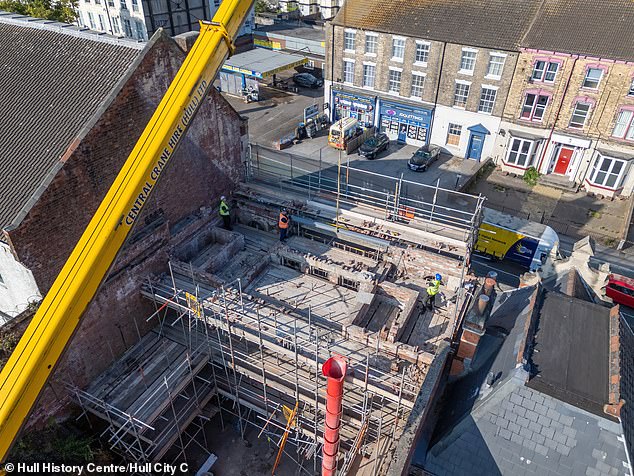Imagine a once-grand cinema, left in disrepair for over 80 years after a devastating wartime bombing, finally getting a new lease on life.
This is the story of the National Picture Theatre on Beverley Road in Hull, a building that has witnessed both history and heartache.
A Bombing That Changed Everything
The National Picture Theatre was tragically bombed by the Luftwaffe during a German air raid on March 18, 1941.
At that time, the cinema was showing Charlie Chaplin’s “The Great Dictator,” a film satirizing Hitler and Nazism.
Despite the chaos, a crucial roof beam protected the 150 people inside, and thankfully, no one was injured.
The theatre’s interior, however, was destroyed, and it has since been a symbol of Hull’s wartime suffering.
Restoration Efforts Underway
After decades of neglect, the theatre is finally getting a new roof.
The roof structure is being repaired by removing old, damaged bricks and clearing away years of accumulated vegetation that had caused cracks.
A drone recently captured the installation of a new steel beam, which will support a roof made from four tonnes of poured concrete.
This is just one step in a long restoration process.
Reviving a Piece of History
The next big task in the restoration will be specialist concrete repairs to two beams across the gallery.
To rebuild the supporting columns, period bricks reclaimed from other Hull buildings are being hand-selected.
Local contractor Hobson and Porter is leading the restoration, funded by The National Lottery Heritage Fund, the council, and the National Civilian WW2 Memorial Trust.
The cinema, which gained Grade II listed status in 2007, will feature new windows, lighting, and work on its facade once restoration is complete.
The project is set to wrap up in December, transforming the cinema into an educational facility and a memorial for families affected by the Blitz.
The Blitz: Britain’s Darkest Days
The Blitz, which began on September 7, 1940, was the most intense bombing campaign Britain has ever faced.
Over 20,000 tonnes of explosives were dropped on 16 British cities, including Hull, which was the second most bombed city in England.
The campaign led to extensive damage: over 86,000 houses were affected, and 152,000 people were left homeless.
Hull’s resilience is a testament to its spirit, despite the city suffering from 82 raids and significant destruction.
A Legacy of Survival
Throughout the Blitz, some iconic landmarks, like St Paul’s Cathedral, survived the bombings almost unscathed.
Deeply-buried shelters offered the best protection, though the government initially resisted using tube stations as shelters to avoid disrupting commuter travel.
Eventually, stations were opened to the public as air raids intensified.
The Blitz ended in May 1941, as Hitler shifted focus to invading the Soviet Union.
The destruction, including significant bombings in cities like Birmingham and Bristol, left a lasting impact on the UK.
As the National Picture Theatre rises from the ashes, it will stand as a powerful reminder of the past and a beacon of hope for the future.
